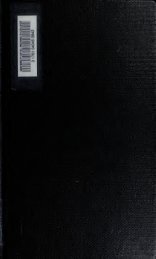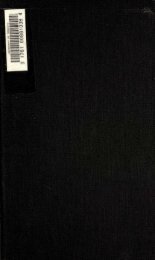Texts from the Buddhist canon : commonly known as Dhammapada
Texts from the Buddhist canon : commonly known as Dhammapada
Texts from the Buddhist canon : commonly known as Dhammapada
Create successful ePaper yourself
Turn your PDF publications into a flip-book with our unique Google optimized e-Paper software.
'<br />
—<br />
WIDE AND DIFFUSIVE. 135<br />
and grossness of habit ; if you would escape <strong>from</strong> this condition,<br />
<strong>the</strong>n you must give up your luxurious living, and<br />
afterwards you will become thin again. And <strong>the</strong>n <strong>the</strong><br />
Lord added <strong>the</strong>se stanz<strong>as</strong> :<br />
' "<br />
A man ought to recollect and consider at every<br />
meal to exercise self-control, and thus avoid those<br />
aches and pains to which we are constantly liable<br />
by allowing time for taking food, he causes his life<br />
to be prolonged."<br />
On hearing <strong>the</strong>se verses, <strong>the</strong> king w<strong>as</strong> so gratified that<br />
he ordered his chief cook to remember <strong>the</strong>m, 'and to recite<br />
<strong>the</strong>m in his presence before and after every meal. By<br />
doing thus <strong>the</strong> king w<strong>as</strong> able to restrain himself, and<br />
gradually recovered his lightness of body and animal<br />
spirits, at which- he w<strong>as</strong> so rejoiced, that one day he went<br />
afoot to <strong>the</strong> place where Buddha w<strong>as</strong>, and coming into his<br />
presence he paid him homage. On <strong>the</strong> Lord requesting<br />
him to be seated, he inquired, "Where, king, are your<br />
horses and chariot, how is it that you have come here<br />
afoot ? " On which <strong>the</strong> king answered with joy— " By<br />
attending to what Buddha, on a former occ<strong>as</strong>ion taught<br />
me, I have become light of body again, so that I find no<br />
difficulty whatever in walking <strong>as</strong> I have to <strong>the</strong> place<br />
where we are now <strong>as</strong>sembled." Then Buddha addressed<br />
<strong>the</strong> king <strong>as</strong> foUows :— " Mah§,raja !<br />
it is because men do not<br />
consider <strong>the</strong> impermanence of things in <strong>the</strong> world that<br />
matters are <strong>as</strong> <strong>the</strong>y are. They nourish and cherish <strong>the</strong>ir<br />
bodies and <strong>the</strong>ir appetites, not remembering even <strong>the</strong>ir<br />
own comfort (happiness) in so doing, and thus <strong>the</strong> man<br />
dies and his spirit departs, whilst his body decays in<br />
<strong>the</strong> tomb. The wise man nourishes his soul (spirit), <strong>the</strong><br />
foolish man nourishes his body. If you can understand<br />
this, <strong>the</strong>n you may prepare yourself to receive <strong>the</strong> sacred<br />
teaching (of my doctrine)," and <strong>the</strong>n <strong>the</strong> Lord added <strong>the</strong>se<br />
verses :<br />
—<br />
;





